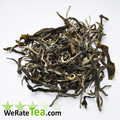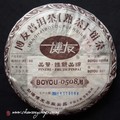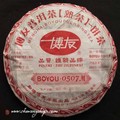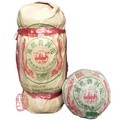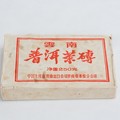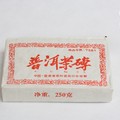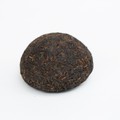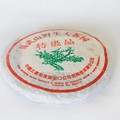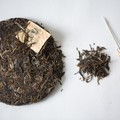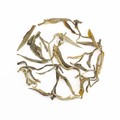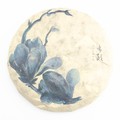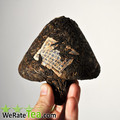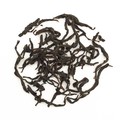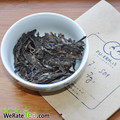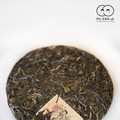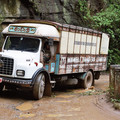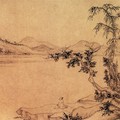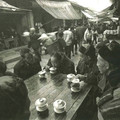China - 5 stars - 4 and more stars
Tea by type
Tea by region
Tea by years and other
2013 Spring Hekai Gu Shu Mao Cha
 1 review
1 reviewThe mao cha were picked on the same day from the same tea garden. Light yellow liquor with rich scents of wildflowers; approachable, with a soft, smooth mouthfeel; fresh, delicate taste. This excellent sample will help to know the taste of Hekai tea.
2005 Boyou TF 0508M Ripe Puerh Cake
 1 review
1 reviewBoyou was founded in 2005, now is one of the factories which still adhere to the strictest sanitary standard in Xishuangbanna. Boyou TF hire Master Huang An Shun who was fermentation workshop director working at the Menghai Tea factory since 1957 to be supervisor for fermentation process. 05 series ripe puerh is the first batch of products. Used 2005 fermented and matured materials, after more than six months storage, select eight grade material and blended into this...
2005 Boyou TF 0507M Ripe Puerh Cake
 1 review
1 reviewBoyou was founded in 2005, now is one of the factories which still adhere to the strictest sanitary standard in Xishuangbanna. Boyou TF hire Master Huang An Shun who was fermentation workshop director working at the Menghai Tea factory since 1957 to be supervisor for fermentation process. 05 series ripe puerh is the first batch of products. Used 2005 fermented and matured materials, after more than six months storage, select 7th grade material and blended into this...
2004 Jin Hao Feng Huang Ripe Puerh Tuo Cha 100g
 1 review
1 reviewThe best ripe tuo cha this factory has ever made. The 801 product line is well known for the highest grade of leaves and mellow taste. Handpicked in high mountains (more than 2000 meters high mountain area in Wuliangshan), large leaf tea. Finely and traditionally processed. After 7 years aging, the tea produces sweet, smooth taste and aged fragrance of dried longan. A full deep ruby colored liquor with nice aroma. Very good storage in Kunming! Such a good tea is...
Shu 7581 - 1998
 1 review
1 review„tailor-made” private production “Zhong Cha Gong Si” This tea was stored for the whole time in mountain district of Taiwan. 7581 is the number and formula which originated in Kun Ming Tea Factory, the earliest production was in 1970 decade and famous for the fragrance of jujube. 75 means the year they started to use this recipe, the 8 means the grade of tea leaves are larger and older and with some stems, the 1 refers to the factory code which is CNNP This...
Shu 7581 - 2002
 1 review
1 review„tailor-made” private production “Zhong Cha Gong Si” This tea was stored for the whole time in Guangzhou, moved to Taiwan in July 2013. 7581 is the number and formula which originated in Kun Ming Tea Factory, the earliest production was in 1970 decade and famous for the fragrance of jujube. 75 means the year they started to use this recipe, the 8 means the grade of tea leaves are larger and older and with some stems, the 1 refers to the factory code which is...
Shu Tuocha 2003
 1 review
1 review„tailor-made” private production “Zhong Cha Gong Si” in Dayi (Menghai tea factory). This tea is made by a dayi employe on a special request from Taiwan. This is a perfect, aged shu pu-erh tea for a reasonable price. Why? It was produced in large scale so the final price of this tea is very affordable. It was stored in Taiwan and in 10 years transformed into a stage when this shu pu-erh is very tasty to drink. This private production tea is not burdened with a famous brand name so...
Big Green Tree Yiwu 2001
 1 review
1 review„tailor-made” private production “Zhong Cha Gong Si” in Dayi (Menghai tea factory), so in case you see the 2001 BGT paper wrapper looks different. This tea is made by a dayi employe on a special request from Taiwan. Material is ancient tea trees, I would say gushu at very high rate. Taste is nicely aged, fine and smooth but still could move forward as there is still bitterness that will in next years transform to sweetie tones. Storage in Guangzhou...
YiWu 2012 autumn
 1 review
1 reviewpressed by stone mold into 250 grams cakes, autumn maocha Massive sweetishness in the back of the mouth, already like in throat, fruity tones, buttery-biscuit like texture. The exact whereabouts of this tea garden is not known even to my 'buyer' friend in Jinghong
2013 A few Single Trees (maocha)
 1 review
1 reviewThis tea is a blend of a few single tree teas from Bangwei and Bulang. These trees stand out from their neighbours as some of the biggest and oldest trees in their gardens. This is a very special tea. It is composed of a large proportion of buds, from the first flush of Spring. The taste is very pure, thick and with plenty of strength. There is a hint of taste from the wok, perhaps it wasn't cleaned properly between batches during hand-processing, but this should settle over the...
2012 EoT Bulang Puer Tea 400g
 1 review, 1 comment
1 review, 1 commentThis tea was a bit of an experiment for us. We'd found 2 different maochas from Bulang mountain, which were each excellent, but in different ways. One was old trees from around Manmu village, while the other was old trees from a few km away. We went back and forth, trying to choose one of them to press into cakes, and in the end decided to blend the two teas. The Manmu was very pure in flavour with a strong qi and strong ku (pleasant bitterness), the other was thicker in the mouth and more...
2006 Longyu Brand Bulangshan Jin Cha Raw 250g
 1 review
1 reviewRaw Jin Cha is especially for Tibetan market, used to be mixed with milk, it is very helpful for the digestion. This Jin Cha is made of sun-dried large leaves material from Bulang mountain. The tea liquor is deep golden and flavored. Stimulation and rich in mouth with floral sweet aftertaste. This raw Jin Cha can also brewed in Tibetan way of tea with milk, butter and salt (or sugar).
2013 Wuliang Wild Hongcha
 2 reviews
2 reviewsThis tea is collected from ancient, wild trees on Wuliang mountain. These are truely wild trees, that haven't been planted by humans and average around 800-1000 years old. The leaves naturally have honey like characteristics in the taste and aroma, which lends them very well to being made into hongcha (Red/Black tea). I find it difficult to get excited by many hongcha - the oxidisation often seems to mute many of the characteristics of teas that I find most enjoyable. This one...
ManSa 2013 - blind tasting set 7
 1 review
1 reviewflowery, in some parts honey, narcotic aroma, taste goes to honey, sweetish tones, verry fancy tea, just like teas from Mansa are this spring hand-pressing of pu-erh cakes was done in a very skilled manufacture in Yiwu, is more tight than previous years, there is more work for me when taking apart the tea leaves for samples, but for long term storage the tight pressing will allow keep longer the aromas, the tea leaves won't dry that much, during this tighter pressing the man...
YouLe 2013 - blind tasting set 6
 1 review
1 reviewdense, rich, bitter-sweet, fruity aroma, full body floods the whole mouth and gives a feeling of oily brew, later steeps taste bitter-sweetish leaving a nice feeling in a mouth, the tea is a great premise for aging, strong, tight pressing has already started up the fermentation this spring hand-pressing of pu-erh cakes was done in a very skilled manufacture in Yiwu, is more tight than previous years, there is more work for me when taking apart the tea leaves for samples, but for...
Theme
Quotes
„Pu-erh shape - Bing, Beeng, Cake, or Disc - A round, flat, disc or puck-shaped tea, the size ranges from as small as 100g to as large as 5 kg or more, with 357g, 400g, and 500g being the most common. Depending on the pressing method, the edge of the disk can be rounded or perpendicular. It is also commonly known as Qīzí bǐngchá (七子餅茶, literally "seven units cake tea") because seven of the bing are packaged together at a time for sale or transport.“
Latest posts
01.01.2016 @ 18:14:35 - Eternal Spring:
WeRateTea.com wish you all the best for 2016!...
07.12.2015 @ 09:07:02 - sypalino:
I decided to taste this tea 2 weeks after delivery. The cake is lightly pressed, so...
09.11.2015 @ 21:58:19 - Eternal Spring:
Comparison of 2013 Bada Pu-erh.sk with <a...
09.11.2015 @ 09:34:07 - Eternal Spring:
Lao Yu 2013 is now about 2,5 years old tea and out of this 1,5 year stored in Europe....
09.11.2015 @ 09:33:11 - Eternal Spring:
Comparison of all three Lao Yu is now done :)
15.10.2015 @ 11:06:37 - Eternal Spring:
2015 Chawangpu Collection – I can only tell, that all teas are very good :)
09.10.2015 @ 10:31:19 - Eternal Spring:
It was quite long and difficult tasting to make a decision… There is still quite...
24.01.2015 @ 16:55:57 - Eternal Spring:
WeRateTea.com wish you all the best for 2015!...
30.12.2014 @ 17:19:22 - Eternal Spring:
"FT(For Taiwan)" means this brick was a special order of "Fei Tai" Company. Fei Tai...
13.08.2014 @ 18:24:28 - Eternal Spring:
We compared two teas from Youle. 2005 Jinuo Shan You Le "Red Sun Drum" and 2009...
Tea by region
We will help you with tea selection.
Do you like quality loose tea?
We will help you to find the right one for you. Be inspired by tea ratings of other tea lovers. Rating stars could help you.


Review your cup of tea.
Review the tea you are drinking and help other tea lovers to find the right cup of tea.






 Shops
Shops
